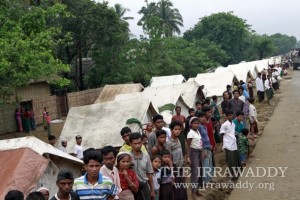The Tyranny of Tier Two
By Burma Partnership • August 4, 2015 On 27 July, the U.S. Department of State released the annual Trafficking in Persons (TIP) Report for the year 2015. The report places countries around the world in one of four categories based on their commitment to enacting legislation and criminal penalties in regards to human trafficking, empowering law enforcement with the skills necessary to identify trafficking networks, and efforts to create protection services for trafficking victims. This year Burma was again given a “Tier 2” rating – which it has maintained since 2011 – implying that, “The Government of Burma does not fully comply with the minimum standards for the elimination of trafficking; however, it is making significant efforts to do so.”
On 27 July, the U.S. Department of State released the annual Trafficking in Persons (TIP) Report for the year 2015. The report places countries around the world in one of four categories based on their commitment to enacting legislation and criminal penalties in regards to human trafficking, empowering law enforcement with the skills necessary to identify trafficking networks, and efforts to create protection services for trafficking victims. This year Burma was again given a “Tier 2” rating – which it has maintained since 2011 – implying that, “The Government of Burma does not fully comply with the minimum standards for the elimination of trafficking; however, it is making significant efforts to do so.”
The decision to keep Burma out of Tier 3 status, along with the promotion of Malaysia to Tier 2, has drawn considerable criticism from a number of human rights organizations. According to Matthew Smith, Executive Director of Fortify Rights, “The decisions regarding Malaysia and Myanmar were largely political and don’t reflect either country’s record on human trafficking. This decision is a disservice to the many victims and survivors of human trafficking.” Instead, critics believe Burma’s promotion to be based on the reluctance of the U.S. and the international community to showcase the long-touted “emerging democracy” as anything but an astounding success.
According to the statement released by Fortify Rights, the TIP report largely ignored the contribution of the Burma Government to the systematic abuse of the Rohingya religious minority, which recently led to a spiraling out of control refugee crisis in the Andaman Sea. The massive exodus of Rohingya out of Burma towards countries like Thailand and Malaysia has created a significant population of individuals vulnerable to traffickers wishing to capitalize on their desperation for economic opportunities and a life free from abuse. It is, after all, the discriminatory policies of the Burma Government that have driven thousands of fleeing Rohingya to become enslaved in Thailand’s notorious fishing industry. In a separate statement, Smith noted that, “Myanmar and Thailand have been complicit in a deadly trade in Rohingya asylum seekers that has generated up to $250 million dollars for transnational criminal syndicates since 2012.”
Internal human trafficking is also readily apparent in a number of Burma’s ethnic areas. The Burma Army has been known to use the forced labor of Rohingya, including that of children, despite a promise from President Thein Sein that the practice would be eliminated during the reform period. Child Soldiers International has also compiled disturbing information on the use of child soldiers through two separate reports this year. The first report, from January 2015, highlights the repeated and widespread recruitment of children by the Burma Army, occasionally involving intimidation or coercion. A subsequent report in July 2015 also indicated that the practice of recruiting child soldiers was pervasive among armed ethnic groups, in this case, the Kachin Independence Army.
Dr. Saw Ivan, operations director at World Vision Myanmar, spoke with Channel News Asia of the opportunities for greater labor exploitation that will inevitably come along with Burma’s recent economic expansion. In reference to rural populations, he stated, “When you come from the villages, if you … don’t understand the labor law, if you don’t understand the trafficking, your rights, any time you can be exploited.”
Sex trafficking of women, especially amongst vulnerable ethnic groups displaced as a result of conflict and extreme poverty, has also been widely reported along the Kachin-China border. China’s Yunnan, in particular, has maintained its status as a historical hub for forced marriages and bride trafficking primarily from Kachin State.
Despite how widespread human trafficking has become for Burma, there appears to be little accomplished towards finding a solution to the problem. The Myanmar Times has pointed out that the TIP report mentions a severely limited number of prosecutions and reporting on trafficking cases, despite evidence that these cases are occurring frequently. Also worth mentioning is the absence of cases in Arakan State, which is worrisome considering the extent of the abuse facing the religious minority in the region.
As a signatory of the United Nation’s Protocol to Prevent, Suppress, and Punish Trafficking in Persons, Especially Women and Children, Burma is expected to demonstrate a commitment to addressing the problem of human trafficking. However, considering the pervasiveness of human trafficking in Burma – both internal and as a source country for neighboring countries – it is clear that the efforts of the Burma Government to combat the issue are either ineffective or non-existent. Unfortunately, as a Tier 2 country in the 2015 TIP report, Burma has escaped much of the international pressure, in the form of sanctions that are required to motivate the government to better address this problem.
The international community must ensure that human rights, especially for victims of trafficking, are prioritized over competing political or economic interests. The root causes of trafficking in Burma, including the vulnerability of ethnic groups as a result of state sponsored discrimination, must be addressed in all legislation surrounding human trafficking in the country.
Tags: and Punish Trafficking in Persons, ASEAN, Burma Partnership, Ethnic Groups, Kachin Independence Army, Malaysia, Rohingya, Suppress, the United Nation’s Protocol to Prevent, Trafficking in Persons, U.S. Department of StateThis post is in: Blog
Related Posts








 All posts
All posts